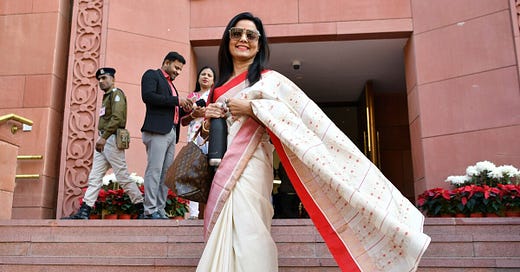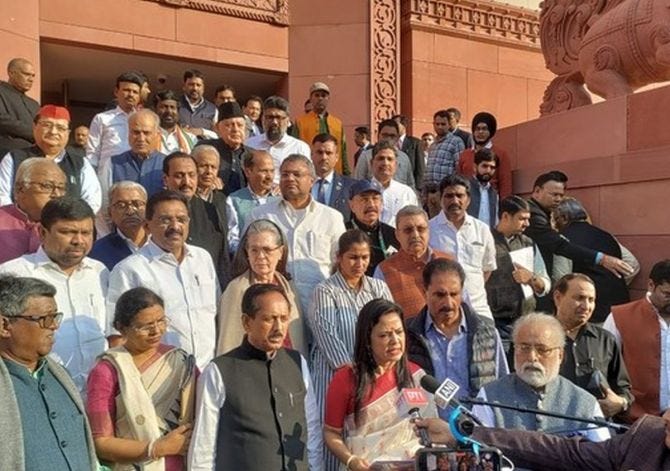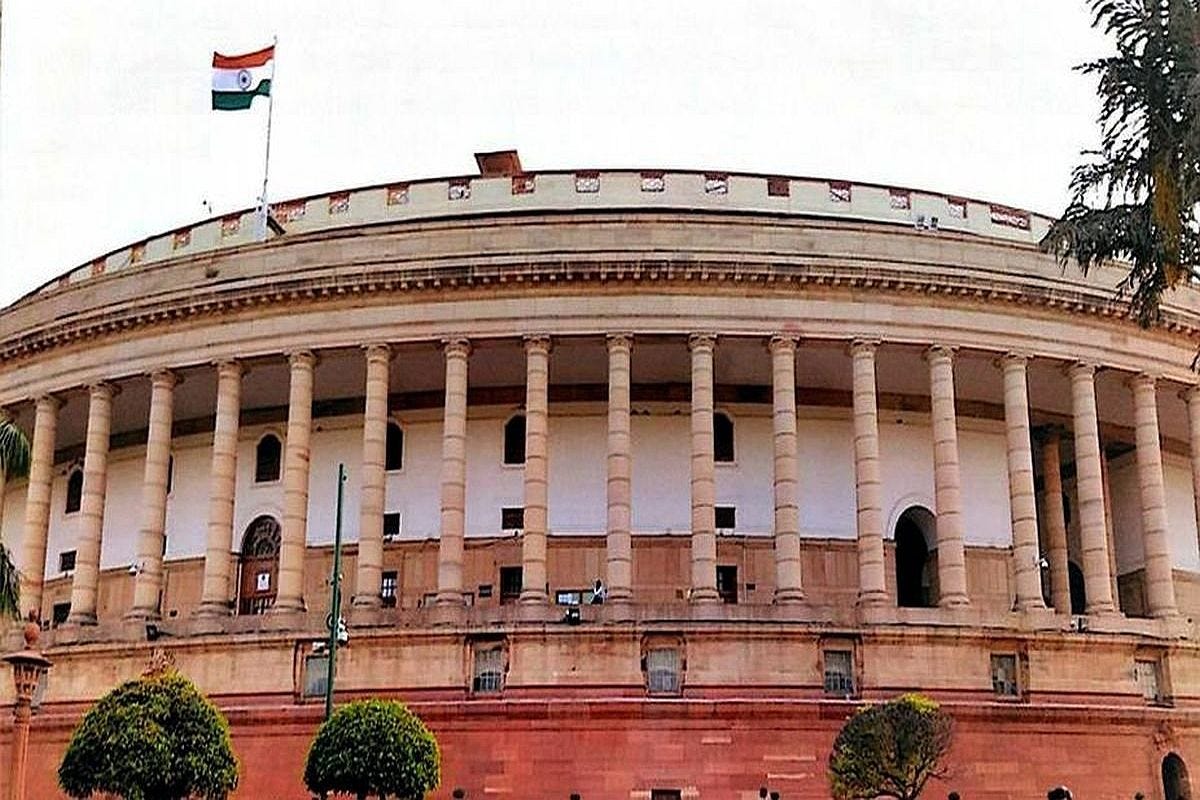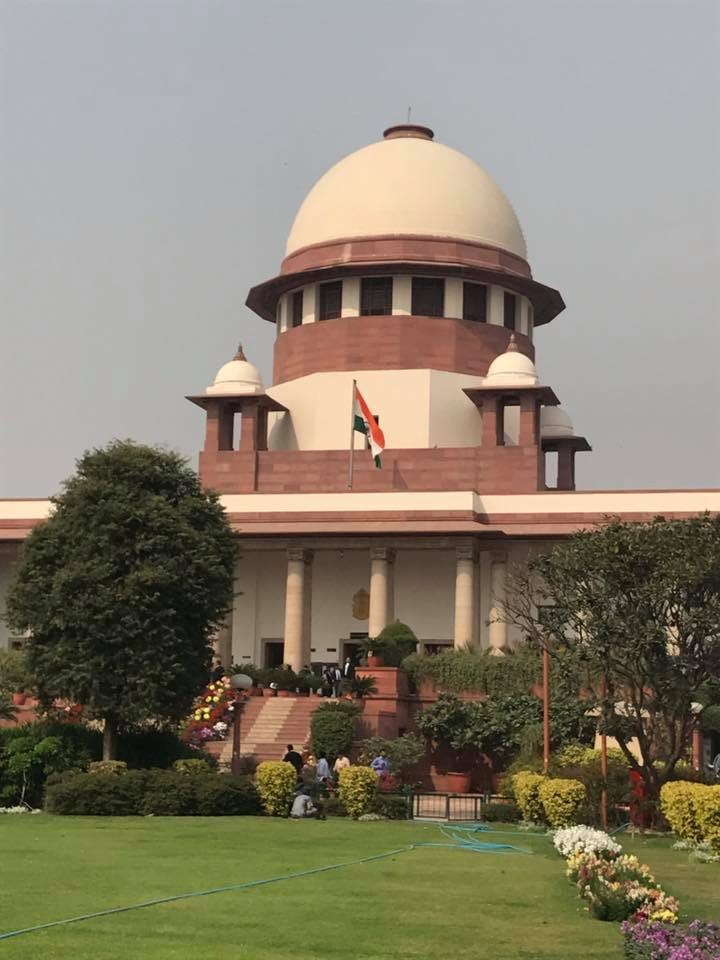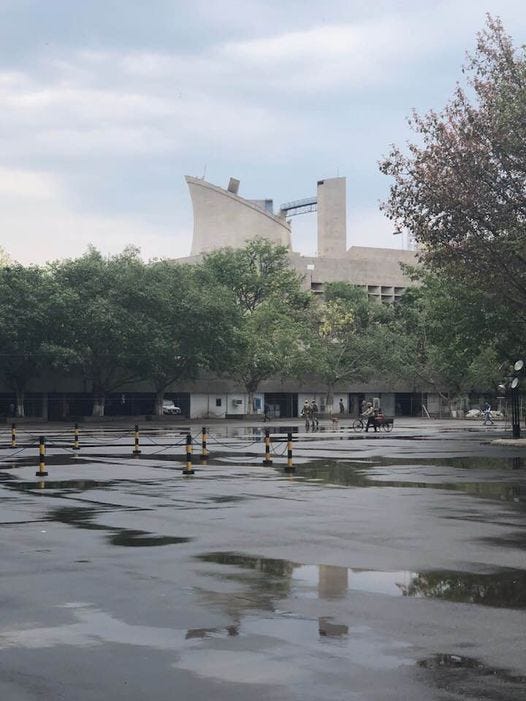Mahua's Fiery Phonetic Fusillade: Kangaroo Court's Quotable Quote
Mamata Moans Mahua Moitra's Muzzling: INDI Alliance Stands By Her in Solidarity.
Mamata Decries Moitra's Expulsion as Undemocratic
In a development that we saw coming, Trinamool Congress (TMC) MP Mahua Moitra was today afternoon expelled from the Lok Sabha amidst allegations of 'unethical conduct' and 'serious misdemeanours' probed by the Ethics Committee. This contentious move sparked a wave of criticism from the opposition parties, led by West Bengal Chief Minister and TMC Chairperson Mamata Banerjee. Ms Mamata vehemently condemned the expulsion, labelling it a blatant 'murder of democracy' and a clear manifestation of 'vendetta politics' by the BJP. Asserting her Party's unwavering support for Moitra, Ms Banerjee stressed that the expulsion would only strengthen Moitra's resolve and public image. She criticized the hasty and unilateral nature of the expulsion, pointing out the unfairness in denying Moitra a proper opportunity to defend herself. This sentiment was echoed by the INDI Alliance, who stood in solidarity with Moitra and the TMC in this episode.
Adding to the drama, Ms Moitra, known for her fiery and indomitable spirit, addressed the media impromptu at the Parliament's threshold post-expulsion. In her impassioned speech, she vowed to combat the BJP to the end, declaring her readiness to fight in the streets and gutters until she succeeds. This defining moment has been captured in a 5-minute video, which Ms Mahua Moitra subsequently posted on her X (formerly Twitter) handle.
The opposition, particularly the Congress, responded strongly to Mahua Moitra's expulsion. In a show of unity, Congress leader Sonia Gandhi and other Opposition MPs joined Ms Moitra outside the Parliament, lending their support and drawing attention to the broader implications of this incident on the democratic process.
((Our previous story follows, except for the important update regarding expulsion in the concluding para.))
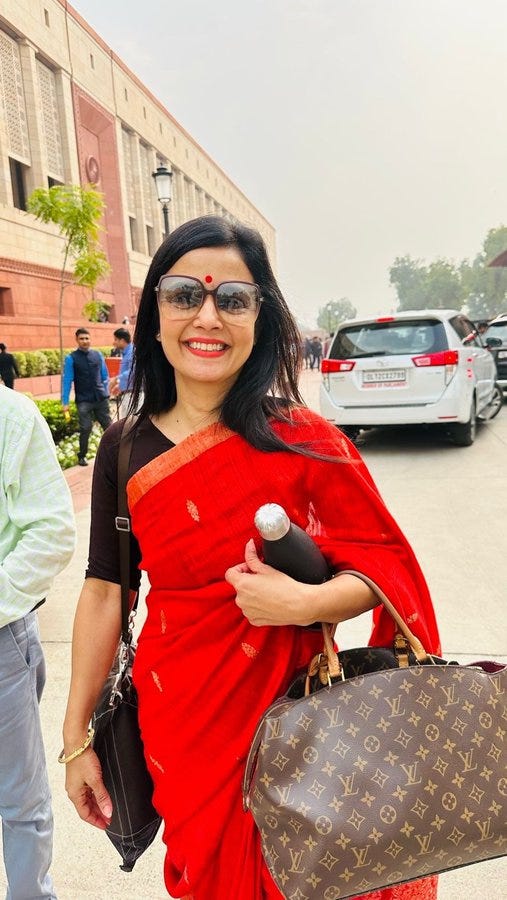
Story on Verge of Breaking
With the Ethics Committee of the Lok Sabha, after its preliminary enquiry, having recommended the expulsion of the TMC MP Mahua Moitra, many believe it is only a matter of a few days before a formal resolution of Lok Sabha, expelling the combative, articulate and telegenic MP is formally adopted. Interestingly, both the Constitution of India as well as the “Rules of Procedure and Conduct of Business of Lok Sabha”, which had been amended to include the provisions of the Ethics Committee, are silent about the expulsion of the Members of the Lower House.
The Supreme Court's 2007 Precedent (Cash-for-Question Expulsions in 2005)
However, this matter has been settled by the Supreme Court of India in litigation that emanated from the implementation of the recommendations of the Pawan Bansal Committee report, in the very first year of Manmohan Singh’s UPA-I Government, that led to the expulsion of 10 Lok Sabha and one Rajya Sabha MP, in the year 2005. The Apex Court had in 2007 upheld the decision of the House and ruled that although the provision of “expulsion” was not specifically mentioned in the Constitution, it was a part and parcel of the Parliament privileges immunities embodied in Article 105, since the House was obligated to ensure ethical conduct by its Members1. The Pawan Bansal Committee had been constituted following a sting operation carried out by the Internet portal CobraPost that had caught these MPs on video, allegedly demanding or accepting cash for questions to be put in the Parliament.
Opposition’s Reaction— then
Notably, all, apart from one MP who belonged to the ruling Congress Party, all others were members of the opposition parties, including six from BJP and three from BSP. Senior Leaders of Opposition, including BJP’s LK Advani and VK Malhotra, while condemning the act, if proven true, had then strongly opposed the expulsion, equating it with “capital punishment” and totally disproportionate to the allegations, which had not been proven in a court of law.
Does Expulsion Disqualify from Recontesting?
Interestingly, this expulsion did not bar or disqualify an expelled MP from contesting again, whether in the Lok Sabha or Rajya Sabha elections or even as an MLA. A few of those have not only contested but also won, and the previous expulsion does not in any way bar or disqualify a person from contesting elections at a future date.
Prosecution Post-Expulsion
Interestingly, a Special Court in Delhi, in pursuance of a consequential FIR that was registered in 2009, has framed charges against these MPs in the year 2017, and those alive are still facing trial, although the same is not showing much progress. Ironically, the two web portal journalists, who had conducted the sting operations, had also been named in the FIR, but proceedings against them had been quashed by the Delhi High Court ruling that they were neither participating nor abetting the alleged act of corruption, but merely reporting it or recording it.
Comparing the Supreme Court Judgements
While the 2007 Supreme Court judgement in Raja Ram Pal Ram Pal v/s The Hon’ble Speaker case may not come to the rescue of Ms Mahua Moitra – as a matter of fact, it may go against her— question arises whether the Supreme Court judgement of 2010 in the case of the expulsion of Captain Amarinder Singh as an MLA of the Punjab Vidhan Sabha in the year 2008, would come to her rescue or support. This aspect has been not discussed either in the mainstream media, whether print or electronic, or the other legal portals.
Supreme Court on Captain Amarinder Singh’s Expulsion (2010)
Following Punjab Vidhan Sabha elections in the year 2007, which the Congress party led by Captain Amarinder Singh lost in Punjab, led to the formation of the SAD-BJP government, headed by Parkash Singh Badal as chief minister. While in the case of an alleged scam pertaining to Ludhiana Improvement Trust an FIR implicating Captain Amarinder Singh was directly registered, an alleged scam relating to exempting a private coloniser from compulsory land acquisition by Improvement Trust Amritsar was consigned to a Punjab Vidhan Sabha committee headed by an Akali Dal MLA, Harish Rai Danda, who is a qualified lawyer.
The Committee, after conducting a swift, preliminary enquiry, had recommended the registration of an FIR against Captain Amarinder Singh and other ministers and public servants, while also recommending the expulsion of the former Chief Minister, Captain Amarinder Singh from the Punjab Vidhan Sabha. The resolution was adopted by Punjab Legislative Assembly on September 3, 2008, relying on the precedent of the Pawan Bansal Committee report. His seat was declared vacant and the Election Commission was requested to conduct a by-election.
Captain in Supreme Court
This resolution of Punjab Vidhan Sabha, including the proceedings of the enquiry committee, were challenged by Captain Amarinder Singh in the Supreme Court of India, which granted him interim relief and allowed him to attend the Vidhan proceedings, while staying the by-election. In the final order, a 5-Judge Constitutional Bench of the Supreme Court, headed by Chief Justice K G Balakrishnan, in April 2010, set aside the expulsion resolution dated September 3, 2008, and reinstated his membership with the following broad observations.
Key Observations by the Supreme Court
Firstly, the Apex Court opined that the allegations against Captain Amarinder Singh related to the due discharge of his duties as a public servant, in his capacity as the Chief Minister, while taking executive decisions. Therefore, the proper course would be for the ordinary criminal law to take its normal course, rather than the House Committee coming into the picture and expelling Captain Amarinder Singh, through a summary enquiry, essentially on the grounds of breach of legislative privileges.
Secondly, the Supreme Court distinguished his case from that of the cash-for-questions, which directly related to dereliction of duty of MPs and lowering the prestige of the Lower House by prima facie accepting cash to put parliamentary questions.
Thirdly, the Court noted that the alleged actions of omission and commission attributed to the former CM pertained to the 12th Vidhan Sabha, while the action was being taken by the 13th Vidhan Sabha.
Lastly, the Apex Court also clarified that nothing in its order should be construed as any immunity from or bar against investigation, or prosecution in respect of alleged criminal offences. It is altogether a different matter that those cases were subsequently withdrawn, by the Badal Government (2012-17) even though a formal charge-sheet had been submitted and the trial had commenced after the framing of formal charges by the Special Court.

Analysis of Mahua Moitra's Case
Mahua Moitra, in our humble opinion, cannot derive any benefit from the ruling of the Constitutional Bench of the Supreme Court in the case of Captain Amarinder Singh, since the allegations against her do not pertain to her duties as a public servant, taking executive decisions. As a matter of fact, an MP’s participation in the parliamentary proceedings, including that of the House Committees is not an executive function, by any stretch of imagination. These are more akin to the allegations of cash-for-questions, that the Pawan Bansal Committee had enquired into in the year 2005, since she is alleged to have literally handed over the operation of her Lok Sabha Member's privileged portal to a third person, not even remotely a part of her staff, to post or upload such questions that he might deem fit. The receipt of costly gifts from him, which actually Ms Moitra has openly and voluntarily admitted, completes the element of quid pro quo.
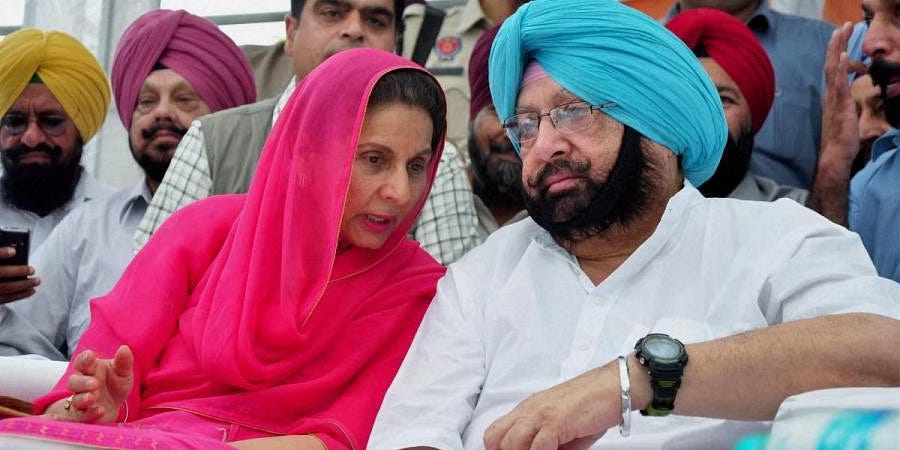
Potential Outcomes for Mahua Moitra
While it is hazardous to guess what will happen next, we venture to enumerate the most likely events, in our opinion, as under:
The Lok Sabha shall adopt a resolution expelling Ms Mahua Moitra, in the ongoing winter session, amidst protest and walk-out by the opposition members.
Miss Moitra would challenge the expulsion in the Supreme Court, but interim relief appears to be unlikely.
The preliminary enquiry being conducted by the CBI shall be concluded expeditiously, leading to the registration of an FIR/RC, that may be accompanied by a CBI search/raids at various connected premises, including her official bungalow in New Delhi.
Although it is unlikely that CBI would arrest her during the course of the investigation, but it is very likely that the agency would seize the costly gifts, including the Louis Vuitton bag(s), and retain them in safe custody as case property to be produced before the Court, as evidence, if and when the trial begins.
The sanction of prosecution, if the CBI investigation leads to that stage, will have to be obtained from the Speaker of the Lok Sabha, before the Special Court can take cognizance of the offences under the Prevention of Corruption Act, 1988, attributed to her.
Ms Moitra is very likely to contest from the same Lok Sabha constituency—Krishnanagar in West Bengal, on the TMC ticket or as an Independent, if denied a party ticket, and likely to win with a thumping majority.
The Income Tax Department may also reopen the cases for the relevant financial years, on account of “income escaping assessment”, and issue her a show cause-notice why the gifts or the deemed gifts not be added to her declared income during those years— leading to tax liability, accompanied by interest and penalty.
The ED may also step in to attach any other property that it may deem as “proceeds of crime”, apart from launching its own investigation, after an ECIR.
Conclusion: A Perspective on the Road Ahead
In closing, we would like to explicitly reiterate and clarify that our discussion does not intend to forecast or predict specific outcomes, even though we have been proven to be correct as regards her expulsion. Rather, it presents what we believe to be the most likely sequence of events, based purely on our analysis and understanding. It is important to recognize that the actual course of events is ultimately uncertain and can only be ascertained over time. Despite this uncertainty, the situation surrounding Mahua Moitra promises to remain a topic of prolonged public and media interest, likely to resurface in prominence with each significant development in the case. The intricacies and implications of her case are poised to leave a lasting imprint on the political and legal landscape, inviting scrutiny and debate for years to come2.
The Supreme Court of India's judgment in the case of Raja Ram Pal vs The Hon'ble Speaker, Lok Sabha (2007) is a significant decision concerning the powers of the Indian Parliament and the scope of judicial review over its actions. This case arose in the context of the expulsion of Members from Parliament following the cash-for-questions scandal in 2005.
Key highlights of the judgment include:
Powers and Privileges of Parliament: The Supreme Court affirmed that the Houses of Parliament possess the power to expel their members, deriving from Article 105 of the Constitution. This power was found to be subject to judicial review, albeit within certain limits.
Scope of Judicial Review: The Court held that while Parliament is a co-ordinate organ deserving deference, its actions are amenable to judicial scrutiny. This means that the court can review parliamentary actions, particularly when they take on the character of judicial or quasi-judicial decisions.
Parameters of Judicial Review: The judgment emphasized that the exercise of power by the legislature, including contempt or privilege, is subject to judicial review. However, it specified that such review does not mean the judiciary is usurping parliamentary jurisdiction. It also stated that the judiciary is not barred from scrutinizing legislative actions that infringe upon fundamental rights.
Presumption of Regularity: There is an initial presumption that Parliament has exercised its powers and privileges regularly and reasonably, in accordance with the law and constitutional provisions. This presumption is, however, rebuttable.
Legislature's Intent and Procedure: The judgment clarified that the court will not presume abuse or misuse of powers by the legislature and that the legislature is generally the best judge of its actions. However, if allegations of extraneous purposes or mala fide intentions are made, the court may examine the validity of such contentions.
Material Supporting Legislative Action: The court stated that even if some material used for legislative action is irrelevant, as long as there is relevant material sustaining the action, judicial interference is not warranted.
Judicial Parameters: The court laid down judicial parameters for examining parliamentary actions, stating that traditional parameters of judicial review may not be appropriate for extraordinary legislative acts.
Role of the Constitution: The court emphasized that the rules which the legislature has to make for regulating its procedure and the conduct of its business must comply with the provisions of the Constitution.
The Raja Ram Pal judgment is pivotal in delineating the balance between the independence of the legislative function and the role of the judiciary in ensuring that legislative actions conform to constitutional mandates and principles.
Of Gifts, ‘Nazranas’ and Favours: Different Hues of Political Donations
Introduction to Political Donations and Global Context Three distinct, but unrelated, developments have recently highlighted the issue of gifts, ‘nazranas’, and favours of substantial pecuniary value received by political figures and public serva…

